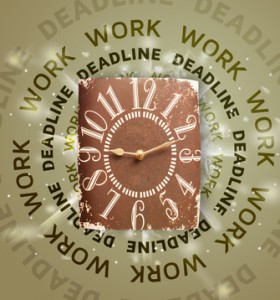 By Kelly James-Enger (@kellyjamesenger)
By Kelly James-Enger (@kellyjamesenger)
You’ve got a month, or maybe just a week or two, to meet a nonfiction writing deadline. But few of us are able to completely set aside family, work, and other obligations when we need to write—meals have to be made, clothes washed, dogs walked, jobs attended to. So it comes down to not how much time you have (which is limited) but how you make the most of that time.
Here are five ways to make the most of your writing time—whether you write for hours or just minutes every day:
Make Lists
Writing down what you need to do will make you more efficient. Create a list of all of the tasks related to the writing project you’re tackling this month. After you’ve got your list, prioritize your top three tasks for the day; and tackle them in order.
In addition to this “must-do” list, maintain a record of your ongoing projects. Some of these may not have firm deadlines, but you don’t want to forget about them because you’re distracted by what must be done today.
Protect your Work Time
Are you a morning person or a night owl? I’ve found that I write more quickly in the morning—in fact, the first few hours in the day are my most productive. By early afternoon, though, it’s harder for me to focus and concentrate. I try to devote my morning hours for hard-core writing and save phone interviews, transcribing notes, researching and other tasks for after lunch. If you know you write better at night, on the other hand, plan your most demanding writing jobs then.
Delete Distractions
Let me just say…no one needs to check their email every five minutes. But sometimes I do. That’s why when I have a deadline, I close Outlook, my email program, and open it at the end of the morning and mid-afternoon. Otherwise I waste time reading emails (even if I don’t reply to them right then). I also keep my browser closed until I’m taking a legitimate work break. I suggest you do the same.
Leave your Computer
Speaking of breaks, research shows that the average person can only listen for 45 to 50 minutes before his attention begins to flag. I’ve noticed a similar drop-off in productivity for writing, which is why I take frequent breaks throughout the day. Aim for a break in an hour, no less, and you’ll get more done even considering your “lost” time–just five or ten minutes away from the computer will help refresh you. I try to do something physical—a quick walk around the block, a few minutes of stretching, or even a quick vacuuming break—that boosts blood flow and eases out the kinks from sitting all day.
Stay Focused
This is my biggest battle—I’m easily distracted. But if you get sidetracked easily, you’ll eat up time without producing any work. Say you’re researching a story, using Google to hunt for sources. You get engrossed in what you’re reading (us freelancers tend to be curious types), and look up to discover you’ve lost a half-hour. I’ll set my watch or use a timer and give myself a specific amount of time to research a topic so I don’t wind up spending my morning scanning celebrity blogs, one of my guilty pleasures.
While there are loads of tools out there to help you manage your time, I assure you that the most valuable isn’t a particular software program but your mindset. You have to make it your goal to be more focused and accomplish more during your writing time. Once you do so, you’ll become aware of your biggest time traps—and happily, discover that many of them are easily overcome with some practice.
About the Author
 Kelly James-Enger is a freelance writing expert and the author of Dollars and Deadlines: Make Money Writing Articles for Print and Online Markets, a book for brand-new freelancers which walks you through 10 actual articles for different markets; how they were pitched, researched, and written; and includes advice on contracts and building your business from scratch. Six-Figure Freelancing: The Writer’s Guide to Making More Money, Second Edition is a freelancing classic that helps both new and experienced writers boost their bottom line. And her newest book, Goodbye Byline, Hello Big Bucks: Make Money Ghostwriting Books, Articles, Blogs and More, Second Edition, shows writers how to break into the ghostwriting/content marketing field.
Kelly James-Enger is a freelance writing expert and the author of Dollars and Deadlines: Make Money Writing Articles for Print and Online Markets, a book for brand-new freelancers which walks you through 10 actual articles for different markets; how they were pitched, researched, and written; and includes advice on contracts and building your business from scratch. Six-Figure Freelancing: The Writer’s Guide to Making More Money, Second Edition is a freelancing classic that helps both new and experienced writers boost their bottom line. And her newest book, Goodbye Byline, Hello Big Bucks: Make Money Ghostwriting Books, Articles, Blogs and More, Second Edition, shows writers how to break into the ghostwriting/content marketing field.
This blog post was drawn from Writer for Hire: 101 Secrets to Freelance Success.
James-Enger blogs about making more money in less time at http://dollarsanddeadlines.blogspot.com.
Photo courtesy of ra2studio | stockfresh.com